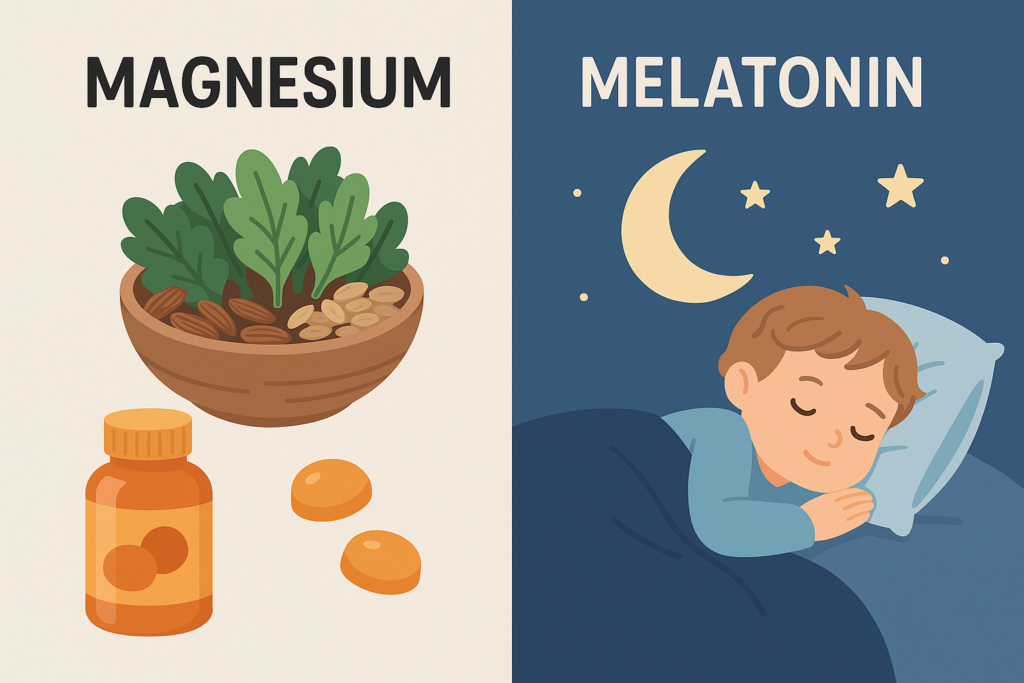
When it comes to helping children sleep better, Magnesium vs Melatonin for Kids has become a hot topic. Many parents are turning to natural sleep aids instead of synthetic medications, but which one is safer and more effective for kids?
Sleep plays a vital role in a child’s development, yet many parents struggle with bedtime battles. Natural remedies like magnesium and melatonin have become popular alternatives to synthetic sleep medications, but how safe and effective are they for kids?
Understanding Magnesium and Melatonin
Magnesium is a natural mineral that supports muscle function, calms the nervous system, and plays a key role in regulating sleep. It’s often found in leafy greens, nuts, and whole grains. For children who struggle with anxiety or restlessness before bed, magnesium may offer a calming effect.
Melatonin, on the other hand, is a hormone produced by the brain to signal bedtime. It tells the body it’s time to wind down and fall asleep. Melatonin supplements are widely used but have sparked debate, especially when used long-term in kids.
Which One Supports Deeper, Safer Sleep?
For kids who have trouble falling asleep due to stress or overstimulation, magnesium may support relaxation naturally. Studies suggest it helps reduce anxiety related sleep disturbances and may even benefit children with ADHD who face bedtime struggles.
Melatonin can be effective for occasional sleep support, especially for children with irregular sleep schedules or jet lag. However, concerns remain about its long-term use. Experts warn that relying on melatonin too often might interfere with the body’s natural sleep-wake rhythm.
Safety and Side Effects: What Parents Should Know
- Magnesium: Generally considered safe when taken in appropriate doses. Magnesium glycinate and citrate are often recommended for children due to their gentle effect on the stomach. Common forms like magnesium gummies are a hit with picky eaters.
- Melatonin: While often used safely in short-term scenarios, some children experience side effects such as nightmares, mood changes, or morning drowsiness. Pediatricians caution against giving melatonin to toddlers unless supervised.
When to Choose What?
| Sleep Aid | Best For | Caution |
| Magnesium | Children with anxiety, ADHD, or trouble winding down | Monitor dosage; check with pediatrician |
| Melatonin | Occasional use (travel, schedule changes) | Avoid long-term use without medical advice |
Expert Tips Before Choosing a Sleep Supplement
- Start with lifestyle habits: a consistent bedtime routine, reduced screen time, and a calm environment.
- Try natural sleep remedies like warm baths, herbal teas (age-appropriate), and white noise.
- Consider combining magnesium and melatonin only under a healthcare provider’s guidance, especially for sensitive sleep issues.
In 2025, parents are becoming more conscious of what they give their children. Between magnesium and melatonin, magnesium often stands out as a gentler, more sustainable choice, especially when sleep challenges are tied to stress or restlessness.
Still, every child is different. Consulting with a pediatrician is always the smartest move before introducing any supplement.
Want more insights on natural health solutions for your family? Stay connected with VitaZenith Life for updated guides and expert-backed wellness content.
